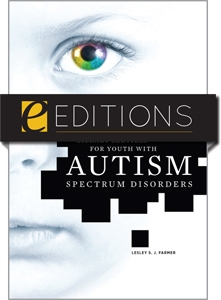
Library Services for Youth with Autism Spectrum Disorders--eEditions e-book
The download link for this product can be found on the final confirmation screen after you complete your purchase, and may also be accessed from your Account Profile. For more information about ALA eEditions file types and how to view them on eReaders, desktop computers, and other devices, see this page.
Primary tabs
You don't need to be an ALA Member to purchase from the ALA Store, but you'll be asked to create an online account/profile during checkout to proceed. This Web Account is for both Members and non-Members. Note that your ALA Member discount will be applied at the final step of the checkout process.
If you are Tax-Exempt, please verify that your account is currently set up as exempt before placing your order, as our new fulfillment center will need current documentation. Learn how to verify here.
- Description
- Table of Contents
- About the author
- Reviews
Autism is now the second most commonly diagnosed serious developmental disability, and the number of children identified as autistic continues to grow. Introducing what autism spectrum disorders are, and identifying the great need to build and manage programs for different youth with these disorders, Farmer offers librarians in or outside a school environment all the information they need to build a library literacy program geared towards these children. Designed to both awaken sensitivities of library staff and address the questions of those who are already aware of the issue, this book
- Shows how children with this diagnosis are increasingly mainstreamed into traditional library and school programs and identifies the special needs and issues they face in a library setting
- Equips readers to meet the needs of young library users who are autistic with practical tools for training library staff, teachers, and volunteers
- Explains hyperlexia, the main barrier to the development of literacy among these children, and how programs using sensory experiences can strengthen both literacy skills and socialization
- Proposes strategies for using library design to ensure that materials and resources are accessible to all patrons
Including a glossary of terms and bibliography of additional resources, Farmer's book is an important tool for raising awareness and supporting literacy development for children with these disorders in the library setting.
Introduction Developmental Characteristics of Youth with ASDs Chapter 1: Youth with ASDs in Libraries and Other Educational SettingsA Word about Public PlacesLibraries from the View of Youth with ASDsEducational SettingsLearning IssuesWhat Helps Youth with ASDs Learn?References Chapter 2: Team Management ApproachTeam Member ContributionsCoordinated Service TeamsDevelopmental Team FunctionsReferences Chapter 3: Inclusion and Universal Design in LibrariesAn Overview of Inclusion and Universal DesignThe Law and Autism Spectrum DisordersFacilitiesResourcesInteractionLearning ActivitiesConcluding ThoughtsReferences Chapter 4: ResourcesThe Senses and Autism Spectrum DisordersThe Role of TechnologyTechnology Resources for Youth with ASDsResource ManagementReferences Chapter 5: Teaching Youth with ASDsThe Librarian's Role in InstructionSetting Up the Physical Conditions for LearningGetting StartedInstructional MethodsMultisensory TeachingCommunication SkillsInteraction IssuesLearning ActivitiesAssessmentConcluding ThoughtsReferences Chapter 6: Focus on ReadingResourcesReading IssuesReading SkillsReading GuidanceStory HoursReferences Chapter 7: The Social Role of the LibraryLibrarian Social EngagementPeer Social EngagementSocial Skills DevelopmentThe Social Side of EmotionsReferences Chapter 8: Behavior ManagementAssessmentApplied Behavioral AnalysisPivotal Response TreatmentSocial Communication, Emotional Regulation, and Transactional SupportSample Programs for PreschoolersDealing with MeltdownsSample Behavior Management TechniquesA Word about Response to InterventionReferences Chapter 9 : TrainingOverview of ASD TrainingTraining for EducatorsTraining for Library StaffTraining for Parents and Guardians of Youth with ASDsTraining for Peers of Youth with ASDsTraining ResourcesReferences Chapter 10: Measuring Impact through Action ResearchWhat Is Action Research?Thinking about MethodologyAction Research on the Individual LevelAction Research on the Library-Program LevelReferences Chapter 11: The Perspective of a Public LibraryPartnerships and TrainingCollection DevelopmentThe Center as SpaceCommunity OutreachChallengesSuccessesConclusion AppendixBibliographyGlossaryIndex
Lesley S. J. Farmer
Dr. Lesley S. J. Farmer, professor at California State University, Long Beach (CSULB), coordinates the Teacher Librarian Program and manages the CSU Information and Communication Technology (ICT) Literacy Project Literacy Project. She earned her MS in library science at the University of North Carolina, Chapel Hill, and received her doctorate in adult education from Temple University. Farmer has worked as a librarian in K–12 school settings as well as in public, special, and academic libraries. She chaired the Special Libraries Association’s Education Divisions and IFLA’s School Library Section. Farmer is a Fulbright scholar and has received national and international grants. She has also been honored with several professional association awards, including the Ken Haycock Award for Promoting Librarianship. Farmer’s research interests include ICT, media literacies, and data analytics. A frequent presenter and writer for the profession, Farmer has published three dozen professional books and more than two hundred professional book chapters and articles. She received the Special Libraries Association's 2023 Rose L. Vormelker Award, which recognizes mid-career members for teaching and mentorship.
"Farmer has written a well organized, theoretical book ... She presents possible project ideas and resources that can be built upon in practice."
— Autism Asperger's Digest


